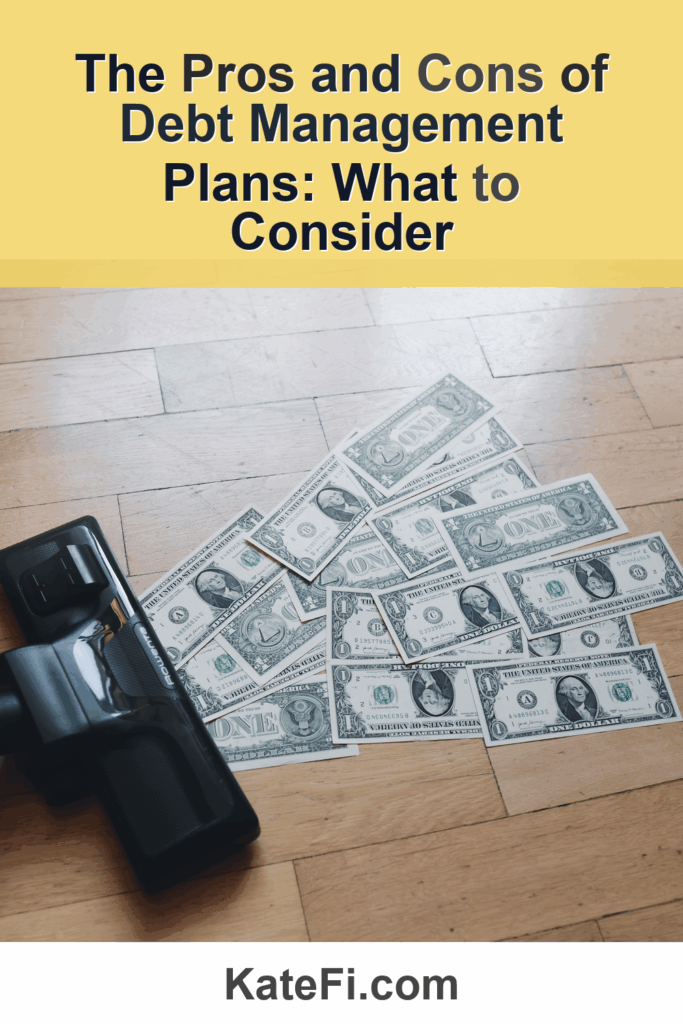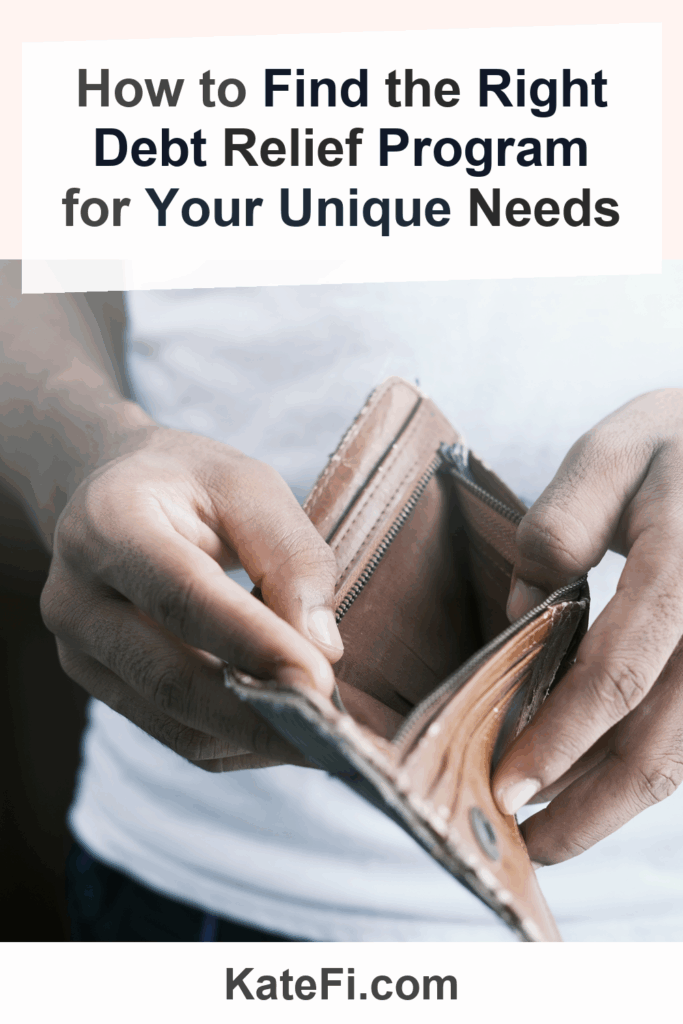Understanding Your Credit Report During Debt Settlement: What to Look For
Navigating the world of debt settlement can be overwhelming, especially when it comes to understanding your credit report and how it may be impacted by your financial decisions. It’s crucial to be well-informed about what to look for in your credit report as you explore options for debt relief. In this blog post, we’ll address common questions related to credit reports during debt settlement, including how to avoid scams and get the support you need.
Love our content? Show your support by following us — pretty please!🥺
FOLLOW ON PINTEREST
Hi! I’m Kate, the face behind KateFi.com—a blog all about making life easier and more affordable.
What Is a Credit Report and Why Is It Important in Debt Settlement?
👉 Start Your Free Debt Relief Review
Not available in IL, KS, OR, TN, UT, WV.
Your credit report is a comprehensive record of your credit history. It includes information on your credit accounts, payment history, outstanding debts, and any public records such as bankruptcies or liens. Understanding your credit report is crucial when you’re considering debt settlement because:
- Lenders Use It to Evaluate Risk: When you apply for loans or credit cards, lenders check your credit report to assess your creditworthiness. A negative report can lead to higher interest rates or denials.
- It Affects Debt Relief Options: Different debt relief options may be available based on your credit score.
- Monitoring Can Help Prevent Scams: Being aware of your credit status can help you identify any fraudulent activity or potential scams.
1. What Should I Look for on My Credit Report?
Here’s a checklist of key items to examine in your credit report:
- Account Information: Check that all accounts listed are yours, including credit cards, loans, and any other debt.
- Payment History: Review your payment history for late or missed payments, which can affect your credit score significantly.
- Public Records: Look for any bankruptcies, tax liens, or judgments against you, as these can remain on your report for years.
- Credit Inquiries: Note how many hard inquiries have been made. Too many can impact your score negatively.
By regularly reviewing these sections, you can stay informed and ready for any necessary actions to take during the debt settlement process.
2. How Does Debt Settlement Affect My Credit Report?
Lower Your Unsecured Debt
If you have $5,000+ in credit card or personal loan debt, a free consult can review options like settlement or hardship plans.
- One-on-one call to review your debts and goals
- See potential monthly payment reductions
- No obligation to enroll
Not available in IL, KS, OR, TN, UT, WV.
Debt settlement can significantly impact your credit report. Here’s how:
- Settled Accounts: When you settle a debt, it will typically be marked as “settled” rather than “paid in full,” which can affect your score.
- Late Payments: If you miss payments leading up to the settlement, those late payments will also be recorded, further impacting your score negatively.
- Timeframe for Recovery: Negative information, including settled debts, can remain on your credit report for up to seven years.
Understanding these aspects can help you strategize your approach to debt settlement and its aftermath.
3. What Documents Do I Need to Gather for a Credit Review?
What You’ll Learn on the Call
- Estimated timeline and monthly payment range
- How credit may be affected in the short term
- What documents to gather to move faster
Not available in IL, KS, OR, TN, UT, WV.
Gathering the right documents can expedite your review process. Here’s a practical checklist of what to prepare:
- Latest Credit Report: Obtain a free report from AnnualCreditReport.com.
- Income Statements: Recent pay stubs or income documentation to demonstrate your financial situation.
- List of Debts: A comprehensive list of all your debts, including balances and monthly payments.
- Financial Hardship Documentation: Evidence of your current financial situation, such as medical bills or unemployment letters, if applicable.
Having these documents ready can enhance the quality of your free consultation.
✅ See If You Qualify for Debt Relief
4. How Can I Avoid Common Debt Relief Scams?
With the rise of debt relief services, scams are prevalent. Here’s how to protect yourself:
- Research the Company: Verify the legitimacy of any debt relief company you consider. Check online reviews and their Better Business Bureau rating.
- Beware of Upfront Fees: Legitimate companies usually don’t require payment before services are rendered.
- Be Cautious of Promises: If a company guarantees a specific outcome, be wary. No one can guarantee debt settlement success.
Staying informed is key to avoiding these pitfalls and securing genuine help.
5. What Are My Rights When Dealing with Debt Collectors?
Understanding your rights is vital in debt settlement:
- Fair Debt Collection Practices Act (FDCPA): This federal law protects you from abusive practices by debt collectors. They cannot harass you, call outside of permissible hours, or use threats.
- Validation of Debt: You have the right to request validation of the debt, which means the collector must prove that you owe the debt they claim.
- Cease Communication: If you feel overwhelmed, you can request that the collector stop contacting you altogether, although this doesn’t absolve the debt.
Being informed about your rights can help you navigate negotiations more effectively.
6. What Should I Do If I’m Being Sued by a Creditor?
If you receive a lawsuit from a creditor, take the following steps:
- Don’t Ignore It: Respond promptly. Ignoring the lawsuit can lead to a default judgment against you.
- Review the Claim: Analyze the claim against you and gather any documentation that supports your case.
- Consider Legal Help: If the situation is complicated, consider consulting with a legal professional who specializes in debt issues.
- Explore Settlement Options: Many creditors are willing to settle for less than the full amount if approached proactively.
Being proactive can lead to more favorable outcomes in these situations.
7. How Can I Validate a Debt I’m Being Asked to Pay?
To ensure that you are paying legitimate debts, follow this process:
- Request Written Validation: You can send a request to the collector asking for proof of the debt, including the original creditor and account details.
- Compare Information: Cross-check the information provided with your own records to confirm its accuracy.
- Consult Professionals: If unsure, a debt relief professional can assist in reviewing the validation and advising you on the next steps.
A systematic approach will empower you to make informed decisions during debt settlement.
8. What Options Are Available for Debt Relief?
Various debt relief options can help you manage your financial burden. Here’s a comparative table to summarize:
| Debt Relief Option | Overview | Pros | Cons |
|---|---|---|---|
| Debt Settlement | Negotiating with creditors to pay less than owed | Can reduce total debt | Negative credit impact |
| Debt Management Plan | Working with a credit counseling agency | Structured payments, lower interest | Fees may apply |
| Bankruptcy | Legal process to discharge debt | Stops collection activities | Long-term credit impact |
| Credit Counseling | Guidance to manage finances | Educational resources available | Doesn’t directly reduce debt |
Consider your options carefully to determine the best fit for your situation. Consulting with professionals can provide valuable insights.
✅ See If You Qualify for Debt Relief
9. How Do I Prepare for a Consultation with a Debt Relief Specialist?
Preparation is key to maximizing the effectiveness of your consultation:
- Be Honest About Your Finances: Provide a clear picture of your debts, income, and expenses.
- List Questions: Write down any specific questions you have regarding your situation and the services offered.
- Gather Documentation: As mentioned earlier, bring the necessary documents to help the specialist assess your situation accurately.
Being well-prepared can lead to a more productive conversation about your debt relief options.
10. How Long Will Debt Relief Take?
The timeline for achieving debt relief varies based on several factors:
- Type of Debt Relief Chosen: Some options, like debt settlement, may take longer due to negotiation processes, while credit counseling can be quicker.
- Cooperation from Creditors: If creditors are willing to negotiate, it may shorten the timeframe.
- Your Commitment: Staying engaged and following through with the plan will also influence how quickly you can achieve relief.
It’s essential to have realistic expectations and to communicate with your debt relief specialist throughout the process.
Important: This content is for education only—not legal, tax, or financial advice. Results and eligible programs vary by situation and state. Fees apply if you enroll and complete a program. Debt relief can affect credit; missed payments may lead to collections/lawsuits. Not available in IL, KS, OR, TN, UT, WV.
Understanding your credit report and its implications during debt settlement can empower you to make informed decisions and avoid scams. If you are considering your options, we strongly recommend






















